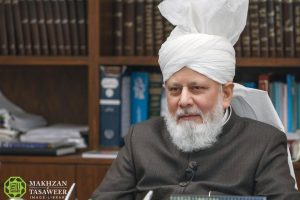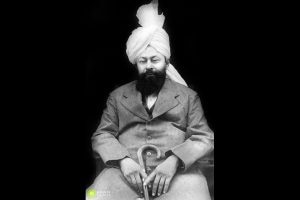
His Holiness, Hazrat Mirza Masroor Ahmad (aba) is a beaming beacon of Divine guidance and support. His Holiness (aba) represents the highest level of a connection with God in today’s world and thus he is the spiritual leader for tens of millions across the world, and champions the message of fulfilling the rights owed to God, and fulfilling the duties we each owe to our fellow human beings. Over the course of his Friday Sermons, addresses on various occasions, meetings with different organizations and children’s classes, His Holiness (aba) imparts invaluable knowledge and insight on a remarkably vast array of topics.
The Review of Religions is honoured to present some of these ‘Rays of Wisdom’ from His Holiness (aba) taken from various sources, for the benefit of its readers.
Contents
Importance of Obedience to Khilafat
The Result of Obedience to Khilafat
The Bond of Love Between a Caliph and His Community
Importance of Obedience to Khilafat

Khilafat, or Caliphate, is a system of successorship established after the demise of a prophet. The primary purpose of a Caliph is to carry forth the mission of that prophet in complete subservience to him and work towards its completion. Not only is this system of successorship found within Islam, but it has also been promised by God in the Holy Qur’an. As such, there was a system of successorship after the demise of the Holy Prophet (sa) known as the Rightly Guided Caliphs (Hazrat Abu Bakr (ra), Hazrat Umar (ra), Hazrat Uthman (ra) and Hazrat Ali (ra). Then, after the demise of the Promised Messiah (as) whose advent was foretold by the Holy Prophet (sa), God’s promise was yet again fulfilled with the establishment of the Caliphate of the Ahmadiyya Muslim Community, which continues and thrives to this day. Although the Caliph leads the Community of the Promised Messiah (as), he cannot be regarded as an ordinary leader. In fact, obedience to the Caliph must exceed the scope of obedience to any ordinary leader, as this is crucial to the true establishment of the Caliphate. His Holiness, the Fifth Caliph (aba) explains:
‘The instruction to obey the commandments of God Almighty and His Messenger (sa) has appeared repeatedly in these verses [The Holy Qur’an 25:52-58]. These verses pertain to the continuation of the establishment of Khilafat [Caliphate]. Thus, in other words, God Almighty is stating that the institution of Khilafat comes under the commandment of showing obedience to God Almighty and His Messenger (sa). Hence, it is incumbent for one to act upon the directives of Khilafat as this is also among the commandments of God Almighty. In fact, in order to secure the continuation of one’s worldly and spiritual life, it is essential for believers to raise the standard of their obedience.
The Holy Prophet (sa) has stated, ‘One who obeys the Amir [leader] appointed by me, in fact obeys me and one who obeys me, in fact obeys God Almighty. One who disobeys the Amir appointed by me, in fact disobeys me and my disobedience equates to the disobeying God Almighty.’ [1]
The obedience of the Khalifa [Caliph] of the time however is even more important than the obedience one shows to an ordinary Amir.
We find accounts of complete and absolute obedience in the lives of the companions of the Holy Prophet (sa). I will present one such example.
During one of the battles, Hazrat Khalid bin Waleed (ra) was appointed as the leader of the army. However, owing to some reason, Hazrat Umar (ra) replaced him while the battle was at its peak. In any case, the instruction of the Khalifa of the time that came at that occasion was that Hazrat Abu ‘Ubaidah (ra) should take charge. However, Hazrat Abu ‘Ubaidah (ra) initially did not take the charge from Hazrat Khalid bin Waleed (ra) thinking that he was already commanding in an excellent manner. However, Hazrat Khalid bin Waleed (ra) said, ‘You must immediately take the charge from me because that is the instruction of the Khalifa of the time. I will serve under you with full obedience as you require of me without complaining or any thought of an ill will.’ [2]
Thus, this is the standard of obedience required of a believer and it should not be the case that if a decision is made against an individual’s wishes, they begin to object to it. Or, if an office-bearer is replaced by another individual, they stop doing their work. Whoever acts in this manner, does not show any obedience and fails to instil the fear of God Almighty and righteousness.’ [3]
The Result of Obedience to Khilafat

Obedience is what sets a true institution of Caliphate apart from any other sort of leadership. Hence, when there is complete obedience in fulfilment of God’s commandments, then a true bond and connection is established between the people and their Caliph, which in turn results in a sense of gratitude towards God for having established this divine institution. Therefore, obedience is at the core of not only strengthening individual bonds with the Caliphate, but is vital in ensuring that we continue to benefit from the blessings of this instituion, as His Holiness (aba) explains:
‘Those who obey and follow Khilafat [Caliphate] with sincerity are the ones who shall have a bond of loyalty with Khilafat in its truest sense. They are the ones who safeguard Khilafat, and who are themselves safeguarded by Khilafat. The prayers of the Khalifa of the time shall be with them. Their troubles and worries shall draw the prayers of the Khalifa of the time. They are the ones who commit righteous deeds and whose connection with Khilafat and the bond of Khilafat with them are for the sake of attaining the pleasure of God Almighty.
Therefore, this is the true Khilafat in which the bond between the community and the Khalifa of the time is for the sake of acquiring the pleasure of God Almighty. This is the Khilafat which shall be a means of stability and peace. This is the relationship between the members of the Jama’at [Community] and the Khalifa [Caliph] of the time, which shall enable both to receive the bounties of Allah the Almighty.
Other Muslims desire to establish Khilafat but want to do so through worldly means and planning. However, this can never avail them, nor can Khilafat be established through such efforts, no matter how hard they try. Now, Khilafat shall continue as God Almighty has decreed.
On the one hand, this should instil within us sentiments of gratitude and cause us to prostrate before God Almighty that He has favoured us with the blessing of Khilafat, but on the other hand, whilst always keeping the fear of God in our hearts, we must assess our actions as to whether they are in line with the commands of God Almighty and the Holy Prophet (sa) and whether our fulfilment of the rights owed to God and the rights owed to humankind is in accordance with the standard Allah the Almighty has prescribed.
Thus, where every moment of an Ahmadi should be spent in gratitude to Allah the Almighty for granting us the blessing of Khilafat, they should also spend that time assessing themselves as to whether they are fulfilling the commandments of Allah the Almighty. When one lives their life bearing this in mind, and moulds their actions in accordance with this, and prays for Khilafat to remain firmly established, then they shall continue to receive God Almighty’s bounties. The Promised Messiah (as) has taught us this very same thing, that God Almighty has reassured him that the institution of Khilafat shall remain established, and these glad tidings given to him by Allah the Almighty shall indeed be fulfilled if we continue to fulfil its conditions.’ [4]
The Bond of Love Between a Caliph and His Community

The unparalleled uniqueness of the Caliphate is that it has been established by God and it cannot be replicated by human effort because the love which exists between a Caliph and his community is also instilled by God. This love is rooted in sincerity and loyalty and in fact, bears testament to the truthfulness of the institution of Caliphate, as His Holiness (aba) explains:
‘…the institution of Khilafat {Caliphate] was established after the demise of the Promised Messiah (as). However, the mere establishment of this institution does not hold any significance unless there is a relationship between the Khalifa [Caliph] of the time and members of the Community based on sincerity, loyalty, devotion and love, and such a bond can only be created by Allah the Almighty.
No individual or human endeavour can create or sustain such a bond. It is this very bond that is the guarantor of the unity and progress of the Community.
Moreover, this is also evidence for the fulfilment of the promise of Allah the Almighty and of His continuous support of the Promised Messiah (as) and of the truthfulness of the Ahmadiyya Muslim Community. The relationship that members of the Community have with Khilafat is possessed by those who have been Ahmadi from birth as well as those who have recently joined, including children, youth, men and women and also by such Ahmadis who live far away and have never even seen the Khalifa of the time.
All these people have excelled in sincerity and loyalty and they continuously try to excel further. Whenever they receive a directive from the Khalifa of the time, they try to act upon it. They express their love and relationship in such a manner that one is truly astounded.
All these things are a practical evidence for the fulfilment of the promise of Allah the Almighty and also the progress of the Community is also dependent upon this relationship. As I said, the relationship that the Community has with Khilafat and in turn, the Khalifa of the time has with the Community, is evidence of the continuous support of Allah the Almighty.’ [5]
ENDNOTES
[1] Sahih al-Bukhari, Kitab-ul-Ahkam, Hadith 7137
[2] Tarikh Tabari, Vol. 2, pp. 356-357
[3] Friday Sermon – 24 May 2019
[4] Friday Sermon – 28 May 2021
[5] Friday Sermon – 29 May 2020




Add Comment